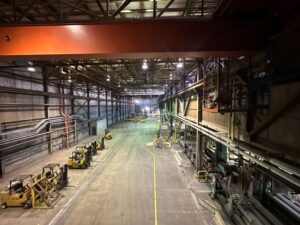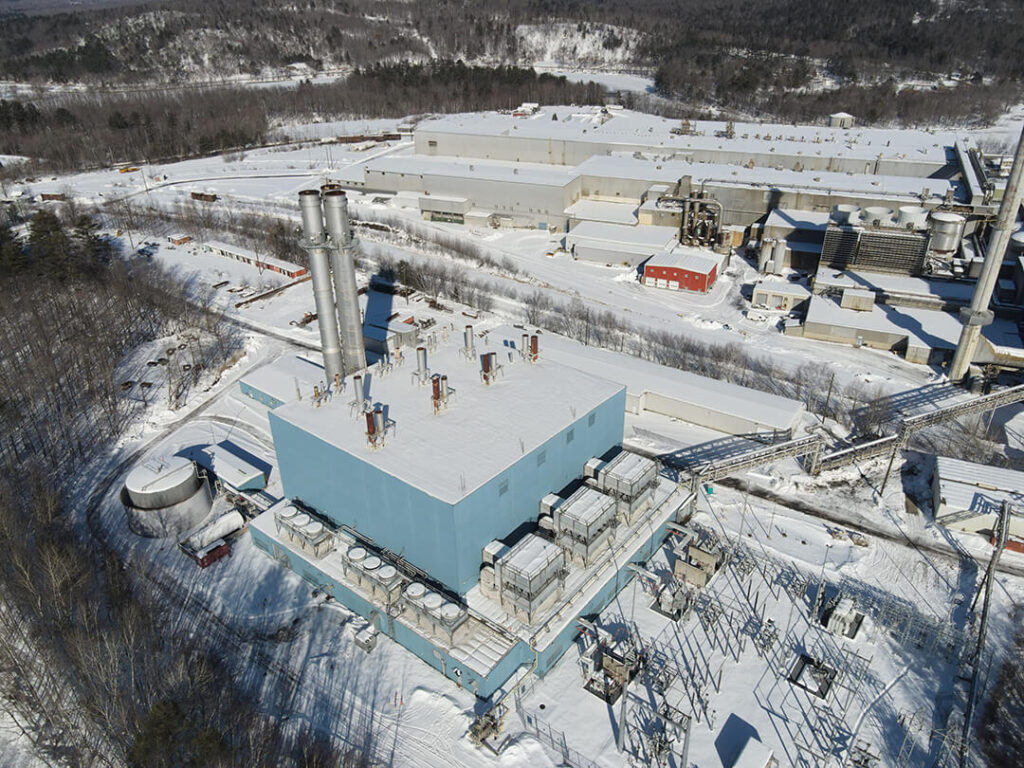April 15, 2024
In one of the more ambitious undertakings seen in Maine’s industrial market in recent years, JGT2 Redevelopment has commenced its revitalization of the Androscoggin Mill in Jay.
Originally developed by International Paper and subsequently operated by VERSO Paper, the mill was acquired in 2019 by Pixelle Specialty Solutions. In 2020, the mill experienced a major industrial accident when its pulp digester exploded, bringing production to a temporary halt. Pixelle brought in pulp from other sources for a while, but in March of 2023 the mill ceased papermaking operations for good.
As soon as Pixelle placed the mill real estate and equipment for sale, New Mill Capital became aware of the opportunity. New Mill is a national asset disposition firm that purchases and sells excess production equipment and real estate assets in a variety of manufacturing sectors. They have been successful in Maine on two prior occasions: the redevelopment of the Hostess Bakery Plant in Biddeford and the repurposing and sale of the Madison Paper Mill, both times teaming up with Tony McDonald, a senior partner at The Boulos Company.
In December 2023, New Mill and McDonald formed JGT2 Redevelopment LLC to acquire and redevelop the Jay mill. Comprising 1,000± acres of land and 1.4± million square feet of buildings, along with an existing 150-megawatt (MW) power plant connected to the grid, the team saw this as a multi-faceted project and also formed JGT2 Energy LLC, to pursue the energy opportunity.
The initial focus was on the opportunity presented by over 1,000± acres of land and the existing 150 MW interconnection to the grid. RLC Engineering was brought in to assess the solar opportunity; it was determined that the site could support a 75 MW solar farm, making it one of the largest solar installations in Maine, able to power 25,000 homes. The existing connection to the grid made the solar opportunity particularly attractive, as connection is a significant part of the cost and development of solar farms.
In addition to the solar opportunity, the mill has three 50 MW-rated gas turbine generators connected to a dedicated natural gas line servicing the site. This 150 MW generating capacity alone could power an additional 50,000 homes. In the papermaking process, the gas turbines generated not only electricity for the grid, but their 900-degree exhaust was utilized to make steam for the paper plant. This supported the prohibitive cost of natural gas in electricity generation.
With no need for steam, JGT2 Energy has opted to run the gas turbines as capacity power generators, providing peak power when demands on the grid are high and additional power is required. This arrangement has the gas turbines running relatively infrequently so that the natural gas costs are not a significant issue, but the dependability and quick-start capability of the gas turbines is key to the needs of the grid for peak power on demand. In addition to 200 MW of power coming in from the grid, these three gas turbines can provide 150 MW of power generated on site for back-up or primary use.
Energy New England and Competitive Energy Services (CES) provided guidance and expertise to assess the combined solar and gas turbine generation plant opportunity and bring it to fruition. CES has been retained to help bring the opportunity to market, as JGT2 Energy seeks to find a joint venture partner or buyer in the generating space.
In addition to the energy assets held by JGT2, there are four hydroelectric generating facilities owned by Eagle Creek Renewable Energy bringing power into the site. Historically, these facilities have supplied all their output to the Jay Mill. While outputs depend on river flow, these hydro units have a nominal output of 25 MW of renewable energy.
On the real estate front, JGT2 Redevelopment has focused on businesses that can benefit from the project’s location in the heart of Maine’s Wood Basket, with its proximity to the renewable resource wood presents, along with the opportunity to utilize renewable energy in their operations.
In March, Governor Janet Mills held a press conference at the Jay project to announce Godfrey Forest Products’ plans to construct a 300,000± SF, state-of-the art Oriented Strand Board (OSB) plant at the Jay mill. This plant, which is expected to employ over 150, will produce OSB to meet the growing demand for this construction product. Unlike plywood, OSB can be made from many tree species and from small diameter trees which makes it a less expensive and more environmentally friendly alternative.

While JGT2 will demolish significant portions of the former paper making operation, approximately 1,000,000± SF of quality industrial space will remain. These spaces, consisting of free-standing buildings as small as 5,000± SF up to the subdividable 950,000± SF main mill building can accommodate users of many sizes and needs. The main mill building offers ceiling heights of 20-70 feet and has overhead cranes throughout the facility with capacity in the 50 – 90-ton range. This primary building can be subdivided easily into sections of 60,000 – 100,000± SF. Rail lines from CSX Rail run through the property with numerous, project-owned spurs entering the buildings, offering enclosed loading and unloading capability. More information on the real estate can be found at boulos.com.
Last but not least, the project has an active wastewater treatment plant, designed for a 50-million gallon per day run rate, though it currently operates at a much lower capacity. This can be useful for certain process manufacturers on site and/or can be utilized to treat wastewater from other locations.
“One hundred megawatts of green, renewable energy, coupled with 150 megawatts of back-up power and 200 megawatts of grid power, all housed within a single building. With soaring 70-foot clear ceiling heights, equipped with overhead cranes and bolstered by rail infrastructure, this facility presents an unparalleled opportunity. It is an honor and an exciting opportunity to be part of the re-purposing of this great property and bring it back to its vital role in the region’s economy.” – Tony McDonald, Senior Partner, The Boulos Company

